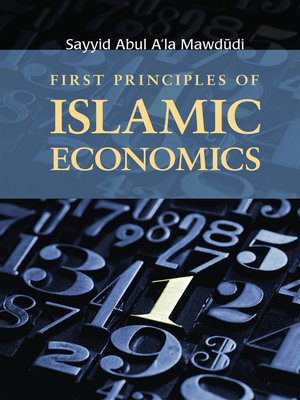
Sign up to save your library
With an OverDrive account, you can save your favorite libraries for at-a-glance information about availability. Find out more about OverDrive accounts.
Find this title in Libby, the library reading app by OverDrive.



Search for a digital library with this title
Title found at these libraries:
| Library Name | Distance |
|---|---|
| Loading... |
Abul A'la Mawdudi laid down the foundations of modern Islamic economics. Drawing upon Islamic sources, Mawdudi spelled out a new paradigm for economic analysis and policy, wherein economic pursuits take place in the context of moral values and are directed towards the achievement of personal and social objectives. Integral to this approach is the concept of an interest-free economy that attempts to make efficiency and equity inseparable and interdependent. The creation and distribution of wealth thus become instrumental in promoting individual and social wellbeing, opening up pathways to development, social justice, and human welfare. This comprehensive anthology collects all of his major writings and provides a historic as well as an essential introduction to Islamic economics.
Abul A'la Mawdudi (1903-1979) was a leading Muslim intellectual and a chief architect of the Islamic revival in the twentieth century. In 1941 he founded Jama'at-i-Islami, a political party in Pakistan, which he led until 1972. He authored more than a hundred works on Islam, both popular and scholarly, and his writings have been translated into some forty languages.
|Abul A'la Mawdudi laid down the foundations of modern Islamic economics. Drawing upon Islamic sources, Mawdudi spelled out a new paradigm for economic analysis and policy, wherein economic pursuits take place in the context of moral values and are directed towards the achievement of personal and social objectives. Integral to this approach is the concept of an interest-free economy that attempts to make efficiency and equity inseparable and interdependent. The creation and distribution of wealth thus become instrumental in promoting individual and social wellbeing, opening up pathways to development, social justice, and human welfare. This comprehensive anthology collects all of his major writings and provides a historic as well as an essential introduction to Islamic economics.
Abul A'la Mawdudi (1903-1979) was a leading Muslim intellectual and a chief architect of the Islamic revival in the twentieth century. In 1941 he founded Jama'at-i-Islami, a political party in Pakistan, which he led until 1972. He authored more than a hundred works on Islam, both popular and scholarly, and his writings have been translated into some forty languages.







